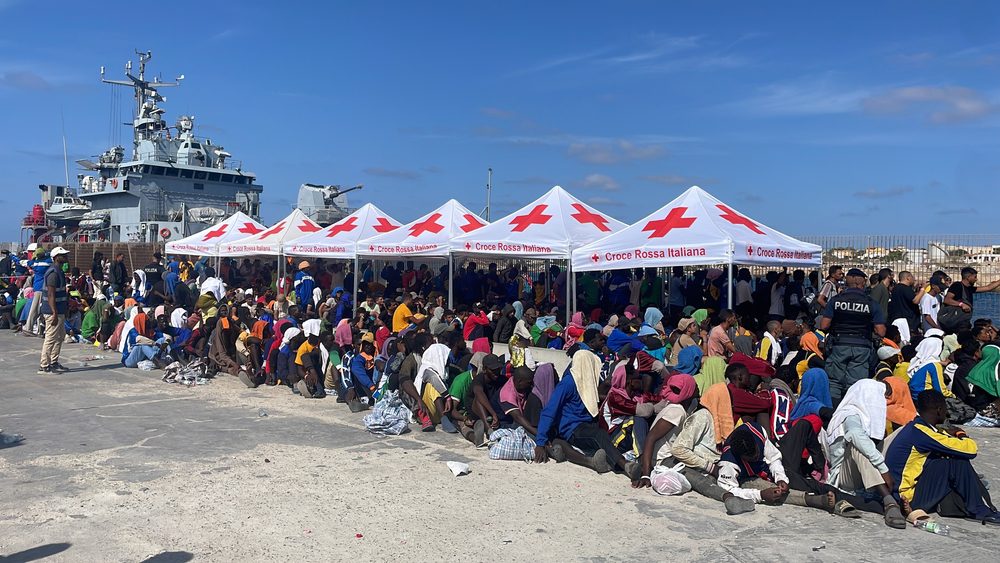
Photo: Alessio Tricani / Shutterstock.com
The southern Italian island of Lampedusa is overwhelmed yet again after around 1,600 migrants arrived on the island in 33 separate landings in just 36 hours as Prime Minister Giorgia Meloni’s government continues to fail to stem the tide of illegal migrant arrivals.
A total of 394 migrants were picked up by Italian authorities, which include patrol boats of the Harbour Master’s office alongside the Guardia di Finanza and the European Union border agency Frontex, in a single night aboard six different boats, the newspaper Il Giornale reports.
The migrants came from Djerba and El Amra in Tunisia, and from Zuwarah and Abu Kammash in Libya, largely aboard rubber dinghies and metal boats, though one landing of 45 migrants took place aboard a yacht.
This is the second illegal landing we have witnessed in the last 13 hours here on Lampedusa.
— Chris Tomlinson (@TomlinsonCJ) October 5, 2023
A group that seems to be entirely consisting of men.
Follow @EuroConOfficial for more details. pic.twitter.com/ctinwL6bRB
The European Conservative observed the arrivals of illegal migrants to Lampedusa last month, noting that migrants were brought to a military area of the island’s main harbour before being checked by Red Cross volunteers and taken to the hot spot reception centre out of the view of the locals and tourists on the island.
The hot spot itself is built to accommodate just 400 or so people but is routinely overwhelmed as it has been this week with the arrival of over 1,600.
Serena Corniglia of the Italian Red Cross (CRI), who manages the hotspot, spoke to The European Conservative last month regarding the issues faced by the organisation and the challenges of constant waves of new arrivals.
She stated that while the Red Cross has faced challenges in housing and caring for migrants when many arrive in a short period, most are only in the hot spot for around 48 hours until they are transferred elsewhere in Italy.
While 1,600 is well above the capacity of the hot spot, it is nowhere near the number of arrivals seen in September when around 5,000 migrants arrived in a single day on Lampedusa, which itself has a population of just around 6,000 people.
Deputy mayor of the island Attilio Lucia spoke out at the time saying, “These numbers lead me to think of an invasion rather than a migratory phenomenon. I feel like saying ‘enough’.”
So far this year, Italy has seen the greatest number of illegal migrant arrivals by sea since the height of the migration crisis in Europe in 2016.
The United Refugee Agency UNHCR reports that at least 146,500 illegal migrants have come to Italy this year, with 123,924 landing in Sicily, of which Lampedusa is a part. The International Organization for Migration (IOM), meanwhile, claims that over 2,400 migrants have died trying to make the dangerous boat journey across the Mediterranean Sea this year.
Italian Prime Minister Giorgia Meloni promised last year during her election campaign to tackle the issue of illegal immigration but the numbers have doubled in the first year of her premiership of the country.
Meloni attempted to negotiate a migration deal with the European Union and Tunisia but Tunisia has been reluctant to really tackle the issue of boats leaving its shores for Europe.
Part of the deal involved payments of up to a billion euros to the Tunisians but the country rejected an instalment of cash from the European Union in October, fueling speculation that the migration deal itself could also fall through.
Tunisian President Kais Saied claimed the European Union had failed to deliver on prior promises regarding helping his country with border security and called the instalment a “small amount.”
“The treasures of the world are not equal to a single grain of our sovereignty in the eyes of our people,” he said and added, “Tunisia, which accepts cooperation, does not accept anything that resembles charity or handouts.”
Meloni has also negotiated a deal this month to outsource asylum claims to Albania, signing a memorandum of understanding with Albanian Prime Minister Edi Rama that would see the construction of a reception facility that will be able to process as many as 36,000 asylum seekers per year.
However, the left-wing parties in the Italian parliament have banded together to attempt to change the deal or get rid of it entirely, proposing a vote on the deal and looking to amend migration policy in the Constitutional Affairs Committee of the Chamber of Deputies.
